Items
Search full-text
“Australia Council start development of Code of Conduct for Access in The Arts”
- Michael Paul
- Michael Trasancos
-
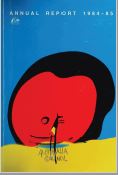 "Australia Council - Annual Report 1984-85" Australia Council Annual Report 1984-85 - discusses functions and objectives, structures, process and membership of Council, Council Committees and members, Board Members, Assessment panels, staff lists, organisation chart, main activities of Council and its Boards, and includes financial statements and lists of grants made including increased artist fees working with minority groups including disabled, fees and costs for artists in Arts Access Society, costs of program for Access Arts (National) cost of playwrights for disabled theatre, and theatre of the Deaf with additional grant support and tours of NSW regional areas for Theatre of the Deaf (NSW).
"Australia Council - Annual Report 1984-85" Australia Council Annual Report 1984-85 - discusses functions and objectives, structures, process and membership of Council, Council Committees and members, Board Members, Assessment panels, staff lists, organisation chart, main activities of Council and its Boards, and includes financial statements and lists of grants made including increased artist fees working with minority groups including disabled, fees and costs for artists in Arts Access Society, costs of program for Access Arts (National) cost of playwrights for disabled theatre, and theatre of the Deaf with additional grant support and tours of NSW regional areas for Theatre of the Deaf (NSW). -
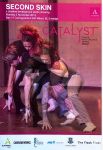 "Accessible Arts - Second Skin 2012 - Promotional Flyer" Accessible Arts - Second Skin 2012 - Programotional Flyer - reads, in part "The Accessible Arts Catalyst Dance Masterclass Series provides skills development and training for dance practitioners, teachers, choreographers and dancers with and without disability currently working or interested in inclusive practice."
"Accessible Arts - Second Skin 2012 - Promotional Flyer" Accessible Arts - Second Skin 2012 - Programotional Flyer - reads, in part "The Accessible Arts Catalyst Dance Masterclass Series provides skills development and training for dance practitioners, teachers, choreographers and dancers with and without disability currently working or interested in inclusive practice." - Bruce Plant
- Kath Duncan
-
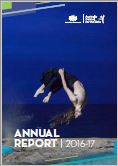 "Australia Council - Annual Report 2016-17" Australia Council Annual Report 2016-2017 – discusses purpose, reports from chair and CEO, year in review, report from the CEO, Strategic priorities, funding overview, statement of outcome, about the Australia Council including The Governing Council and the Board, Structure of the Australia Council with new grants model; performance outcomes, manageability and accountability, financial statements and discussion of the final year of delivering $1.3 million over four years to support artists with disability with their careers and funding more organisations to support producing and touring disability-led and mixed-ability arts practice as well as mentoring arts leaders with disabilities and publication of the Council’s 2014–16 Disability Action Plan review.
"Australia Council - Annual Report 2016-17" Australia Council Annual Report 2016-2017 – discusses purpose, reports from chair and CEO, year in review, report from the CEO, Strategic priorities, funding overview, statement of outcome, about the Australia Council including The Governing Council and the Board, Structure of the Australia Council with new grants model; performance outcomes, manageability and accountability, financial statements and discussion of the final year of delivering $1.3 million over four years to support artists with disability with their careers and funding more organisations to support producing and touring disability-led and mixed-ability arts practice as well as mentoring arts leaders with disabilities and publication of the Council’s 2014–16 Disability Action Plan review. - Kerrie Peters
- Belinda Kirkwood
- David Throsby
-
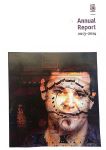 "DADAA Annual Report 2013-2014" DADAA Annual Report 2013-2014 - information about Vision, Mission and Goals, Chairperson and Executive Director’s Reports, Staff list, Staff training and development, Capital works, Participation, Programs including Sculptures by the Sea Tactile Tours, StARTSpeak, Art Link Be Active Program for Children and Young People, Esperance: The Emergence Project, HERE&N0W13, Aging & Disability, Regional Arts Australia Summit, Nexus Arts Grant, Regional Development and Consultancy, Partners, and Financials
"DADAA Annual Report 2013-2014" DADAA Annual Report 2013-2014 - information about Vision, Mission and Goals, Chairperson and Executive Director’s Reports, Staff list, Staff training and development, Capital works, Participation, Programs including Sculptures by the Sea Tactile Tours, StARTSpeak, Art Link Be Active Program for Children and Young People, Esperance: The Emergence Project, HERE&N0W13, Aging & Disability, Regional Arts Australia Summit, Nexus Arts Grant, Regional Development and Consultancy, Partners, and Financials -
“Disability in the Arts, Disadvantage in the Arts, Australia (DADAA), based in Western Australia, is established in 1994” The National Participate Conference, hosted by Arts Access Victoria in 1990, set the scene for the emergence of the DADAA network. This came after several years of conversations among Western Australian artists about starting an organisation; the organisation was officially established in 1994. “In 1986, a small group of artists with disability met to discuss starting their own WA-based arts organisation. It is from this meeting that DADAA slowly grew, from a pilot project it became an organisation in its own right in 1994: taking the name Disability in the Arts, Disadvantage in the Arts, Australia – DADAA.”
- Brisbane Outsider Artists (BOA)
- Janelle Colquhoun
-
"David Throsby, Katya Petetskaya (2024) Artists as Workers: An Economic Study of Professional Artists in Australia, Creative Australia, 2024." "Artists as Workers: An Economic Study of Professional Artists in Australia, by David Throsby and Katya Petetskaya, is the seventh in a landmark study, carried out independently over the last four decades by Professor Throsby and colleagues at Macquarie University, with support from Creative Australia (previously the Australia Council for the Arts). Conducted at roughly six–year intervals, the series tracks the working conditions of artists, providing information about their artistic practice, income, career development and pathways, and their broader working lives. The latest survey was in the field late 2022 and early 2023 and examines activity in the 2021-22 financial year. This edition therefore captures the conditions for artists in the wake of COVID-19 and coincides with the Australian Government’s January 2023 announcement of its five-year national cultural policy Revive: A place for every story, a story for every place."
-
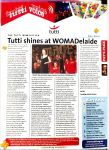 "Tutti Arts - Tutti Voice Newsletter May 2010" Tutti Arts - Tutti Voice Newsletter May 2010 - information about choir, visual arts, performing arts, and digitech programs
"Tutti Arts - Tutti Voice Newsletter May 2010" Tutti Arts - Tutti Voice Newsletter May 2010 - information about choir, visual arts, performing arts, and digitech programs -
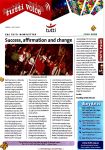 "Tutti Arts - Tutti Voice Newsletter June 2009" Tutti Arts - Tutti Voice Newsletter June 2009 - information about music, visual arts, performing arts and 'digitech' programs
"Tutti Arts - Tutti Voice Newsletter June 2009" Tutti Arts - Tutti Voice Newsletter June 2009 - information about music, visual arts, performing arts and 'digitech' programs -
“Australia Council grants funding for projects about disability or for disabled participants throughout the 1970s” The 1974/75 Australia Council annual report states $1,350 in funding granted to Spectrum Films (NSW) to "develop a screenplay for a feature film of the social pressures on a deaf mute”, as well as a $4,500 travel/study grant to Lloyd Nickson (QLD) "to attend summer schools in children's theatre and theatre for deaf children (USA and UK) for six months". In the same year, the Council reported Bryan Gracey as one of numerous individuals in receipt of Experimental Film funding for his short film ‘The World of a Blind Child’ (1975) about the emotional and physical difficulties 10-year-old Peter faces and how he navigates his disability. In the 1974/75 financial year, Australia Council’s crafts board awarded $1,288 to the Wheelchair and Disabled Association (NSW) for "Jewellery making tools and equipment". The 1979/1980 Australia Council annual report describes the following funding: "As in previous years, a grant was given to the Braille and Talking Book Library for its Braille Book of the Year.”
- Jo Cohen
-
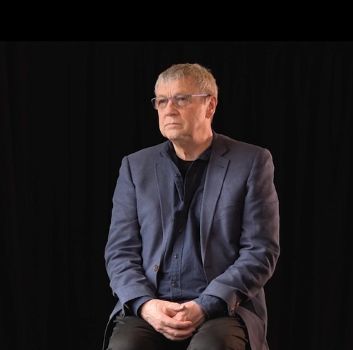 "Interview with Nick Hughes" Nick has worked as an actor, director, writer, artistic director, dramaturg and was the Company Manager for Restless Dance Theatre Interview Summary Nick Hughes is a retired arts administrator who has worked in various capacities within the arts industry, including as an actor, writer, stage manager, and notably as the company manager for Restless Dance Theatre. Nick gained degrees in drama, and sociology, and moved from the UK to Australia in 1973. During the interview, Nick reflects on his significant contributions to the arts and disability sectors. Despite being unfamiliar with disability arts in the beginning, Nick says he became deeply involved and committed to the field, valuing disability arts for the social and political aspects. Nick discusses witnessing first-hand the growth and development of individuals through creative expression. Throughout his career, Nick says he has seen the evolution and increasing recognition of disability arts as a legitimate and powerful art form capable of altering people’s perceptions and advocating for inclusivity and equality in society.
"Interview with Nick Hughes" Nick has worked as an actor, director, writer, artistic director, dramaturg and was the Company Manager for Restless Dance Theatre Interview Summary Nick Hughes is a retired arts administrator who has worked in various capacities within the arts industry, including as an actor, writer, stage manager, and notably as the company manager for Restless Dance Theatre. Nick gained degrees in drama, and sociology, and moved from the UK to Australia in 1973. During the interview, Nick reflects on his significant contributions to the arts and disability sectors. Despite being unfamiliar with disability arts in the beginning, Nick says he became deeply involved and committed to the field, valuing disability arts for the social and political aspects. Nick discusses witnessing first-hand the growth and development of individuals through creative expression. Throughout his career, Nick says he has seen the evolution and increasing recognition of disability arts as a legitimate and powerful art form capable of altering people’s perceptions and advocating for inclusivity and equality in society. -
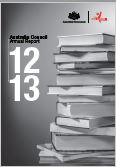 "Australia Council - Annual Report 2012-13" Australia Council Annual Report 2012-2013 – discusses year in review, report from the CEO, Strategic priorities, funding overview, statement of outcome, about the Australia Council including The Governing Council and the Board, Structure of the Australia Council; financial review and discussion of Access Champions group focused on key actions from the 2011–13 Disability Action Plan, including programs for increased participation by artists with disabilities and to develop technical capacity and digital literacy for both operational and artistic activities, funding for exhibition of artists with disability work, premises and Australia Council website accessibility, and participation at national and international arts and disability forums.
"Australia Council - Annual Report 2012-13" Australia Council Annual Report 2012-2013 – discusses year in review, report from the CEO, Strategic priorities, funding overview, statement of outcome, about the Australia Council including The Governing Council and the Board, Structure of the Australia Council; financial review and discussion of Access Champions group focused on key actions from the 2011–13 Disability Action Plan, including programs for increased participation by artists with disabilities and to develop technical capacity and digital literacy for both operational and artistic activities, funding for exhibition of artists with disability work, premises and Australia Council website accessibility, and participation at national and international arts and disability forums. - Toby Matheson
-
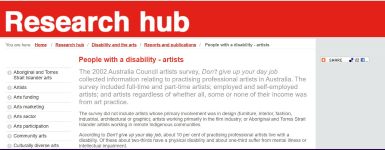 “Australia Council - People with a disability - artists 2003” Sourced from 'Australia Council- Don’t give up your day job: An Economic Study of Professional Artists in Australia' (Throsby and Hollister 2003) based on 2002 Survey - The website reads “The 2002 Australia Council artists survey, Don't give up your day job collected information relating to practising professional artists in Australia…..According to Don't give up your day job, about 10 per cent of practising professional artists live with a disability.”
“Australia Council - People with a disability - artists 2003” Sourced from 'Australia Council- Don’t give up your day job: An Economic Study of Professional Artists in Australia' (Throsby and Hollister 2003) based on 2002 Survey - The website reads “The 2002 Australia Council artists survey, Don't give up your day job collected information relating to practising professional artists in Australia…..According to Don't give up your day job, about 10 per cent of practising professional artists live with a disability.” -
"David Throsby and Virginia Hollister (2003) Don't give up your day job: an economic study of professional artists in Australia, Australia Council" Australia Council- Don’t give up your day job: An Economic Study of Professional Artists in Australia' (Throsby and Hollister 2003) based on 2002 Survey - The website reads “The 2002 Australia Council artists survey, Don't give up your day job collected information relating to practising professional artists in Australia…..According to Don't give up your day job, about 10 per cent of practising professional artists live with a disability.”
- Luciano Giardina
